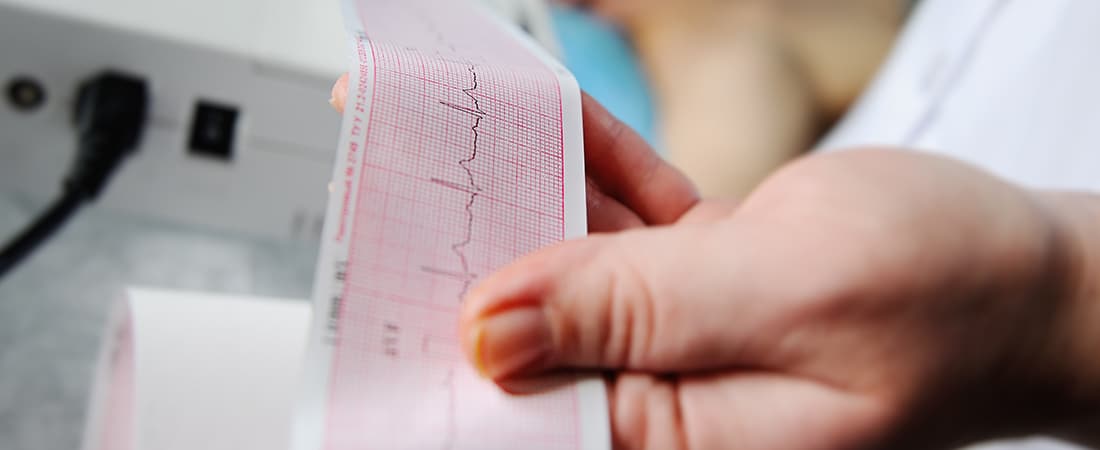Learn more about our Biomedical Services
ECG Monitors
Electrocardiogram – ECG Monitors – Terrain Biomedical – 773-697-8400
Terrain Biomedical sells, repairs and supports most makes and models of ECG monitors. Applying calibrated test equipment to assure optimal performance, our team delivers high quality, reconditioned ECG or EKG units for all sorts of medical care environments.
An Overview of ECG Monitors (Also Called EKGs)
An ECG Monitor is medical equipment that is used to record the electrical signals of a patient’s heart. It is a commonly performed test used for detecting heart problems and to monitor the heart’s condition in a variety of situations. ECGs are frequently performed in a physician’s office, a medical clinic or in a hospital. ECG Monitors have become a standard piece of equipment in most operating rooms and ambulances too.
An ECG provides a noninvasive and painless testing procedure that yields fast results. During an ECG test, sensors that are able to detect the heart’s electrical activity are attached to the patient’s chest. The sensors are typically left in place for only a few minutes or so. Because of the quick results, doctors or other medical staff are able to discuss the information with patients on the same day as the procedure or at the next appointment.
Other ways of monitoring heart rhythms:
For those patients who have heart rhythm irregularities that are not constant, it might not be captured sufficiently within the few minutes that a conventional ECG Monitors is in recording mode. In this instance, some doctors might recommend another form of monitoring the heart rhythm.
The Holter monitor. This monitor is a relatively small and wearable device that can record a continual ECG, typically for one or two days. Wiring from sensors placed on the patient’s chest connect to a battery-operated recording unit easily carried in a pocket, on a belt or on a shoulder strap. While a patient is wearing a Holter monitor, they are generally able to resume their regular activities as long as the sensors and monitor remain dry. Additionally, doctors may instruct their patient to maintain a journal of their activities and when they engage in them. Then the doctor will be able to compare the journal information with the unit’s electronic recordings to try and assess the cause of the irregular heart rhythms.
Event monitor. For patients who do not experience symptoms of irregular heart rhythms frequently,
their physician might in some cases recommend that they wear an event monitor. This easily transportable unit is comparable to the Holter monitor. However, it only records at specific times and only for a few minutes. With an event monitor, patients may wear it for as long as one month.
In most models of event monitors, the unit is activated by simply pressing the record button when the patient experiences symptoms or has a rapid heart rate. Other monitors will automatically detect irregular heart rhythms and then begin recording. The patient can send the ECG monitor readings directly to their physician through their mobile phone.
Stress testing. If a patient’s symptoms tend to occur most frequently while exercising, their doctor may request that they walk upon a treadmill or pedal a stationary exercise bike during an ECG Monitor session. This is generally known as a stress test. In the event that a patient has a medical condition that makes it too difficult for them to perform an exercise, the doctor might opt to inject the patient with a drug that replicates the effect of exercising.
Implantable loop recorders. Similar to a Holter monitor, this device continuously records the heart rhythms but for a longer period of time. An implantable loop recorder is positioned under the skin in the patient’s chest area during a minor surgical procedure and can remain in place for as long as three years.
How ECG Monitoring Works – ECG Monitors
Every beat of the heart is initiated by an electric pulse usually generated by “pacemaker” cells within the heart’s upper right chamber. An electrocardiogram simply records the pace and strength of the electrical signals as they move through the heart.
An electrocardiogram is also referred to a 12-lead EKG or ECG because it collects information from 12 various areas on the patient’s heart. These views are generated by sensors placed upon the patient’s chest. The electric pulse activity is recorded and represented by wave lines on a graph, with the different patterns indicating electrical phases of the heartbeats. An ECG machine is able to record an abnormal heartbeat only when it occurs during a test.
What does an ECG reveal and why patients should monitor their ECG
An ECG test tracks your heart’s electric pulse activity and represents it in the form of a moving line of peaks and valleys. It basically displays the electric current that travels through the heart. Everyone has their own distinct ECG tracing, but there are some patterns of an ECG test that can signal various kinds of heart issues like arrhythmias. So, just what does an ECG Monitor reveal? Generally, it shows if the patient’s heart is functioning correctly or if it is encountering some sort of a problem and signals what that issue might be.
The benefits of having an ECG
An ECG Monitor test serves to identify and help care providers diagnose a range of cardiac problems. It is among the most commonly used ways to check if a patient’s heart is in healthy condition or to monitor existing heart problems. If you have been experiencing some health symptoms that may be related to cardiac problems, if there is a history of heart disease among your family or if you have lifestyle patterns that negatively impact your general health, you can likely benefit from an ECG test or long range ECG monitoring.
Is an ECG Monitor able to identify a stroke?
ECG monitoring can identify a cardiac problem that might result in a stroke or even reveal a past cardiac problem such as a prior heart attack. Frequently, an ECG Monitor is the method of choice for detecting these issues and is used, for instance, to verify and track atrial fibrillation, which is a condition that causes blood clotting that can lead to a stroke.
What other cardiac issues can an ECG monitor identify?
There are quite a few heart problems that may be pinpointed thanks to the assistance of ECG testing. Some of the most commonly detected are cardiac arrest, arrhythmias, heart attack, heart defects, insufficient blood supply, heart inflammation and coronary artery disease.
It is essential to establish the heart’s performing baseline and to consistently check for changes in the patient’s heart activity because there are many problems that do not have symptoms. Good heart health relies on several factors including lifestyle choices, genetics and other health issues.
Learn more or place an order for ECG and EKG Machines today at 773-697-8400
About Terrain Biomedical
Terrain Biomedical is staffed by experienced engineers who function as a dependable resource for all varieties of medical equipment transactions – from the initial equipment purchase all the way through ongoing maintenance and support.
At the core of our business, we believe that our valued clients deserve much better than run-of-the-mill equipment sales. It’s why we founded Terrain Biomedical to serve our clients who have a preference for a cost-effective, realistic transaction not just from a sales standpoint but from a position of comprehensive services.


